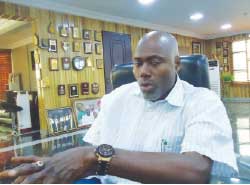Yusuf Ali, an erudite lawyer and prolific legal analyst, was conferred with the respected title of Senior Advocate of Nigeria (SAN) in 1997. In this interview with Senior Correspondent, ONYEWUCHI OJINNAKA, he expresses his position on the 180 days limit for disposal of election petitions, appointment of new CJN, among other issues.
Your learned silk colleague, Wole Olanipekun, has argued that the 180 days limit for election petition is insufficient. Do you align with his view?
It is the constitution that prescribed 180 days for tribunal and 60 days for the Court of Appeal. I read the interview of my brother, Wole Olanipekun (SAN), with whom I agreed on most issues, but I disagreed with him on this issue of 180 days.
What are your reasons for disagreeing with him on the issue?
I had said that before you can approach the tribunal, the electoral law says you must score up to a certain percentage in the election. Somebody scored 40 in governorship election and wants to go to the tribunal. They are just congesting the courts. My argument is that the 180-day timeline has worked so far. We started this thing since 2011; if it were in the past, before the constitution was amended to be 180 days, some of the governorship cases would still be in court now. If you genuinely believe that you have a case, you should do everything you can within the 180 days, which is six months.
For me, I am for 180 days. I respect Olanipekun’s views tremendously, but I do not agree with him. I have always been insisting that 180 days is enough. We have been doing it. Olanipekun and a few of us have been involved in this thing. We know we can do it if we are serious about it because we have to choose between what was happening in the past when simple election matters take four years.
Recently, the Chief Justice of Nigeria (CJN) cautioned judicial officers against giving conflicting judgments on election petitions, especially from the Court of Appeal. What is your take?
It was a timely warning because it is avoidable in this day and age of the internet. The Court of Appeal should device a method where the judgment given, especially in political cases in a particular division, will be circulated to all other divisions, especially when it comes to the interpretations of the electoral laws. The world has moved from the days of cyclostyling judgments. Now you can just upload your judgments. So I think it is a good thing that the CJN has called attention to it, and I am sure the leadership of the Court of Appeal will do the needful to address the issue. The easiest way is such that any political matter that is decided by any division of the Court of Appeal is circulated to other divisions, so that the justices will know the thinking of their brothers in the other divisions.
Do you think the Supreme Court is congested?
I pity the Supreme Court. At least, two weeks ago when I was there, they listed almost 19 pre-election matters for just one day and that happened throughout the week. The Supreme Court normally sits in chambers on Wednesday. The justices do not sit in open court. In order to clear the backlog of election matters, they started sitting on Wednesday. We have to appreciate the fact that they are humans after all, and they sit every week even before now. The Supreme Court would sit on Monday, Tuesday and Thursday in open court. On Mondays and Tuesdays, they would take civil matters; on Thursdays, they take criminal matters; on Wednesdays, they sit in chambers to consider non-contentious applications; and on Fridays, they deliver judgments. There is no average week that they would not reserve minimum of five or six judgments that will be delivered in three months.
Should the Supreme Court deal with only constitutional matters?
The states in the United States have their own Supreme Courts, but matters do not end there if they are constitutional matters. It goes to the United States Supreme Court. It is not a bad idea to have states’ Courts of Appeal, apart from the Court of Appeal that is at the federal, if the constitution is amended. That was the scheme in the 1963 Constitution. That was why the Western Region had its own Court of Appeal up to 1976 when the Federal Court of Appeal was established. We can now create Court of Appeal of the states and have Supreme Court for the states. Chieftaincy and land matters should end at the Supreme Court of the states. I think it is high time we had Courts of Appeal and Supreme Courts for the states, and then we ensure that some of these cases end in those places. Let very serious or constitutional issue go to the Supreme Court.
Prior to her retirement, former CJN, Justice Mariam Aloma Mukhtar, attributed the high rate of corruption in the judiciary to conducts of some SANs. Do you agree with her position?
I recall vividly a public lecture which I attended where the former CJN was talking about judges brought before the National Judicial Council (NJC). I remember her comment and I remember my own comment too. If I could recollect, Her Lordship then said that some senior lawyers, not necessarily senior advocates, sometimes defend these judges in four or five persons, and that as far as she was concerned, those lawyers were also part of the problem.
My reply was that there’s presumption of innocence against any accused person of any kind and a person does not become an accessory to crime just because he is doing his or her own job. The constitution has defined the role of each person, each professional in the administration of justice. Because journalists write about corrupt persons, does that mean they are all corrupt? When judges are accused of corruption and any one of them is brought to the NJC, he has the right to be defended.
Is it not an intimidation on the part of those senior lawyers which the former CJN was referring to?
There is nothing like senior advocate intimidating a judge. To the glory of God, I have been senior advocate for more than 17 years. We do not go there with sticks or guns, and it is not all cases a senior advocate wins. I have lost cases to lawyers who are not senior advocates, just like I won cases against senior advocates before I became one. What is the intimidation? So, that perception is not true; it depends on your ability, your knowledge and the facts of the case and the position of the law. So, there is nothing like intimidation. For me, I will not say all senior advocates are saints, but we are not the devil that anybody is trying to paint us. I still know a lot of our colleagues who are as straight as electric pole, who observe all the rules and norms of professional ethics in practice of the law. That does not mean there are not a few bad eggs like in every other profession. We have the bad eggs, but the good people preponderate over and above the bad ones. I do not agree that senior advocates are part of the problem of corruption in the judiciary.
Are you comfortable with the current process of appointing Chief Justice of Nigeria which is based on seniority?
Well, I think we need stability, and my theory all along is that for somebody to be CJN, to be the President of the Court of Appeal (PCA), to be chief judge either of the federal or state High Court, such a person must ordinarily be a person who is fit and proper to be a judge. So if somebody is fit and proper to be a judge or to be a justice, either of the Court of Appeal or the Supreme Court, being the CJN, being the PCA is just administrative, technically. My argument all along is, if somebody is not found to be fit as a CJN or as a CJ of a state, then the person ought not be on the Bench.
For anybody to be on the Bench, it is assumed that he possesses all the qualities of a good judge: deep learning, knowledge, uprightness, ability, incorruptibility, transparency. For the purposes of stability and to ensure that the Supreme Court is not rocked by infighting, the person who is number two is equally qualified like the person who is in number three and number four. I do not have any problem with that. I am happy that there are new guidelines in the appointment of judges. People who may not be justices of the Court of Appeal, who are in private practice and who have done very well, with qualities of being a judge, should be appointed to the Supreme Court and the Court of Appeal as well.












